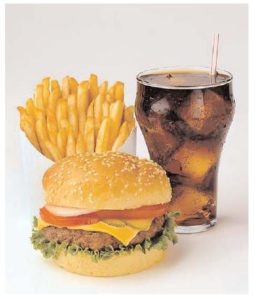 There have been growing concerns about the presence of harmful endocrine disrupting chemicals called phthalates in common products and foods. A recent study found phthalates in a large variety of fast foods purchased from fast food restaurants - from hamburgers and chicken nuggets, to chicken burritos. They found detectable levels of phthalates in all the foods sampled, with meat products having higher levels than non-meat foods, such as fries and pizza.
There have been growing concerns about the presence of harmful endocrine disrupting chemicals called phthalates in common products and foods. A recent study found phthalates in a large variety of fast foods purchased from fast food restaurants - from hamburgers and chicken nuggets, to chicken burritos. They found detectable levels of phthalates in all the foods sampled, with meat products having higher levels than non-meat foods, such as fries and pizza.
This could explain why an earlier study found that people eating fast food had higher levels of phthalates than those who didn't eat fast food (and ate homecooked meals instead).
Phthalates are a group of chemicals used to make plastics soft, but are also known to disrupt the endocrine system. The chemicals leach into the food from the stain and water resistant packaging used for fast foods, and even from the gloves the food handling workers wear. When the foods are eaten, the consumer also ingests these chemicals - and the higher the levels in the body, the greater the health effects.
Endocrine (hormone) disruptors, such as phthalates, are associated with all sorts of health problems, including cancers, reproductive harm (e.g. poorer semen quality), lowered sex and growth hormones in children, thyroid disease, immune effects, and liver and kidney damage. Unfortunately, they are already found in the bodies of almost all Americans, so we should try to reduce our exposure.
Bottom line: try to eat less fast food, and try to eat more home cooked meals. Remember, the more you eat fast foods, the higher the phthalate levels in your body (it's a dose-response effect).
From Science Daily: Potentially harmful industrial chemicals detected in US fast foods
Chicken nuggets, burritos and other popular items consumers buy from fast food outlets in the United States contain chemicals that are linked to a long list of serious health problems, according to a first-of-its-kind study published today.
Researchers at the George Washington University and their colleagues bought fast foods from popular outlets and found 10 of 11 potentially harmful chemicals in the samples, including phthalates, a group of chemicals that are used to make plastics soft and are known to disrupt the endocrine system. The research team also found other plasticizers, chemicals that are emerging as replacements to phthalates.
"We found phthalates and other plasticizers are widespread in prepared foods available at U.S. fast food chains, a finding that means many consumers are getting a side of potentially unhealthy chemicals along with their meal," Lariah Edwards, lead author of the study and a postdoctoral scientist at GW, said. "Stronger regulations are needed to help keep these harmful chemicals out of the food supply."
Previously, a GW research team led by Ami Zota, a professor of environmental and occupational health, looked at fast food consumption in a national survey and found people who reported eating more fast foods had higher levels of phthalates.
In this study, Edwards, Zota and their colleagues purchased 64 fast food items from different restaurants and asked for three pairs of unused food handling gloves. The team tested food items and the gloves for 11 kinds of phthalates and plasticizers, finding that:
-
- 81% of the food samples studied contained a phthalate called DnBP and 70% contained DEHP. Both these chemicals have been linked in numerous studies to fertility and reproductive problems in humans. These phthalates can also increase risk for learning, attention, and behavioral disorders in childhood.
- 86% of the foods contained the replacement plasticizer known as DEHT, a chemical that needs further study to determine its impact on human health.
- Foods containing meats, such as cheeseburgers and chicken burritos, had higher levels of the chemicals studied.
- Chicken burritos and cheeseburgers had the highest levels of DEHT. The researchers noted that food handling gloves collected from the same restaurants also contained this chemical.
- Cheese pizzas had the lowest levels of most chemicals tested.
Phthalates and replacement plasticizers are chemicals used to make plastics soft and can migrate out of plastics into the food, which is ingested. Some sources of plastics include food handling gloves, industrial tubing, food conveyor belts and the outer packaging used to wrap fast food meals available in restaurants.
Previous research by Zota's team suggests that people who eat food cooked at home have lower levels of these chemicals in their bodies, probably because home cooks do not use food handling gloves or plastic packaging. To avoid these industrial chemicals, consumers can switch to mostly home cooked meals, which are often healthier than fast food, Edwards said.
Both Edwards and Zota say their study suggests the need for greater scrutiny and regulation of chemicals used to make food. They point out that replacement plasticizers are increasingly used to replace banned or restricted phthalates yet the studies needed to show that they are safe have yet to be done.
